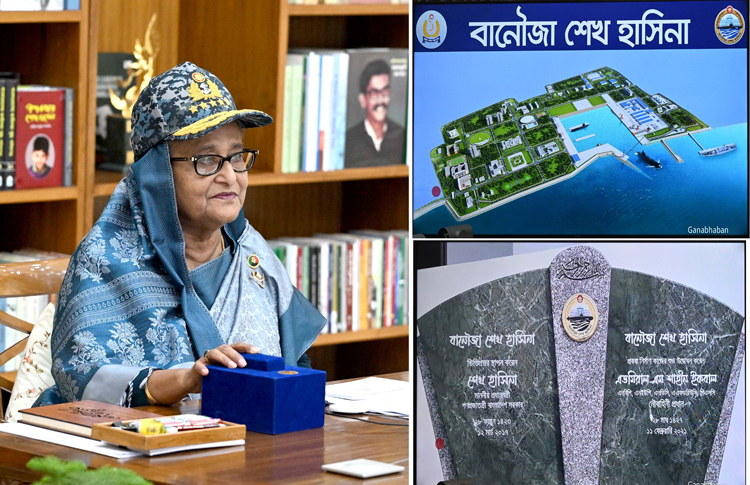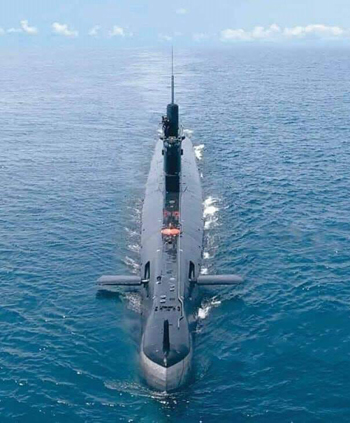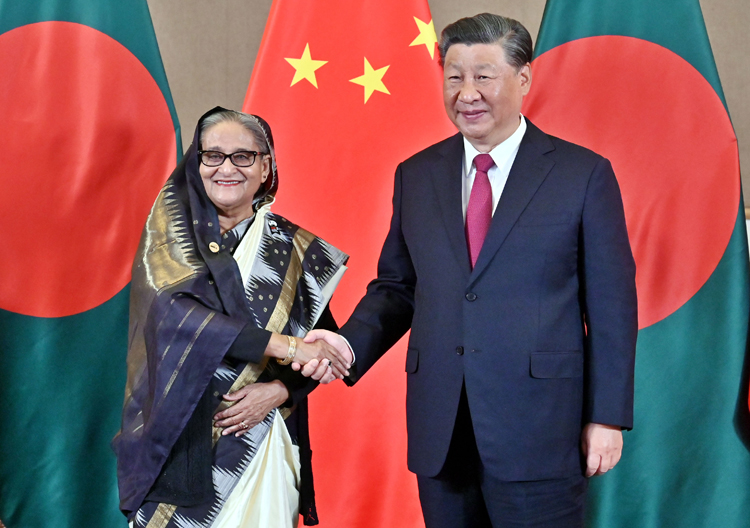INDIAN ARMED FORCES CHIEFS ON OUR RELENTLESS AND FOCUSED PUBLISHING EFFORTS

The insightful articles, inspiring narrations and analytical perspectives presented by the Editorial Team, establish an alluring connect with the reader. My compliments and best wishes to SP Guide Publications.

"Over the past 60 years, the growth of SP Guide Publications has mirrored the rising stature of Indian Navy. Its well-researched and informative magazines on Defence and Aerospace sector have served to shape an educated opinion of our military personnel, policy makers and the public alike. I wish SP's Publication team continued success, fair winds and following seas in all future endeavour!"

Since, its inception in 1964, SP Guide Publications has consistently demonstrated commitment to high-quality journalism in the aerospace and defence sectors, earning a well-deserved reputation as Asia's largest media house in this domain. I wish SP Guide Publications continued success in its pursuit of excellence.
- Prime Minister Modi Visits Punjab’s Adampur Air Base, Interacts with Airmen after Successful ‘Operation Sindoor’; Stern Message to Pakistan
- The layered Air Defence systems that worked superbly, the key element of Operation Sindoor
- Operation Sindoor | Day 2 DGMOs Briefing
- Operation Sindoor: Resolute yet Restrained
- India's Operation Sindoor Sends a Clear Message to Terror and the World – ‘ZERO TOLERANCE’
- Japan and India set forth a defence cooperation consultancy framework, talks on tank and jet engines
Dhaka in Dragon Shadow
China has significantly equipped the Bangladesh military, providing tanks, frigates, fighter jets, and submarines, recently completing the construction of the largest submarine base in South Asia
 |
The Author is Former Director General of Information Systems and A Special Forces Veteran, Indian Army |

Bangladesh Prime Minister Sheikh Hasina winning her fourth term in January 2024, with Awami League and allies winning 225 of the 300 parliamentary seats, perhaps disappointed China. This, because when Bangladesh Nationalist Party (BNP) ruled Dhaka, it was unabashedly pro-China and pro-Pakistan; state-sponsored anti-India terror camps running in Chittagong hill tracts with Al Qaeda and ISI instructors, and Bangladesh Army rehearsing for 'cold start' into the Siliguri Corridor, in conjunction with a Chinese thrust from North?
China has been very focused in drawing India's immediate neighbours into its strategic sphere. The Bangladesh Army is equipped with Chinese tanks, its Navy has Chinese frigates and missile boats and the Bangladesh Air Force fly Chinese fighter jets. In 2002, China and Bangladesh signed a 'Defence Cooperation Agreement' covering military training and defence production. According to China, Dhaka and Beijing are in a "strategic partnership of cooperation". Bangladesh is China's second largest defence customer; procuring 38 per cent of China's defence exports.
Bangladesh Prime Minister Sheikh Hasina won her fourth term in January 2024, with the Awami League and allies securing 225 of the 300 parliamentary seats.
In 2006, China sold 65 large calibre artillery systems, 16 combat aircraft and 114 missiles plus related equipment to Bangladesh. In 2008, China assisted Bangladesh in setting up an anti-ship missile launch pad near Chittagong Port and in conducting a maiden missile test. The anti-ship missile test-fired was the C-802A with a strike range of 120 km; modified version of Chinese Ying Ji-808 with weight reduced from 815 kg to 715 kg to increase the strike range from 42 km to 120 km. The missile was fired from the frigate BNS 'Osman', which is a 1500-tonne Chinese built Jianghu class frigate commissioned in 1989.

In 2011, China delivered two Ming-class submarines to Bangladesh in 2016 and sold two Type 056 frigates to Bangladesh in 2017-2018; BNS 'Shadhinota' and BNS 'Prottoy' to Bangladesh – each ship armed with 76mm and 30mm naval guns and anti-ship and surface-to-air missile systems, Chinese weapons in Bangladesh Army include HJ-8 anti-tank missiles, PF-98 anti-tank rockets and Type-69 rocket propelled grenades.
News reports of February 19, 2022, indicated that China is setting up a missile repair base in Bangladesh. The Bangladesh Army, Navy and Air Forces are equipped with the FM-90 air defence missile system. The truck mounted FM-90 system is an improved version of the "Hong Qi", a missile first produced by the China National Precision Machinery Import and Export Company in 1998. These were supplied to Bangladesh in 2011.
China has been actively drawing India's immediate neighbours, including Bangladesh, into its strategic sphere through military and economic means.
On March 20, 2023, Sheikh Hasina inaugurated the China-built BNS 'Sheikh Hasina', at Pekua in Cox's Bazar; a new first ever full-fledged submarine base that has been developed for the Bangladesh Navy. Construction of the base began in 2019 and was completed in early 2023. Built at a cost of $1.21 billion, it is the largest submarine base in South Asia.
In addition to accommodating six submarines, this base also has a full-fledged naval dock where eight ships can be anchored at a time. It will allow for safe and swift movement of submarines in the Bay of Bengal. The facility can also be used for maintenance and repair of ships and also as a base for logistics and armaments.

It goes without saying that PLA Navy (PLAN) personnel in the form of technicians/advisors would get based in BNS 'Sheikh Hasina' (incognito?) and frequented by Chinese naval vessels and submarines – same as in Kyaukphyu in Myanmar, Hambantota/Colombo in Sri Lanka, in Maldives, and at Gwadar in Pakistan.
In 2012 and 2014 Bangladesh won its maritime disputes with Myanmar and India respectively, allowing it to increase its sovereign claim over the Exclusive Economic Zone (EEZ) to about one lakh sq km, an area almost equal to its land mass. China quickly cashed upon these developments by supplying military and naval hardware to help Bangladesh defend its newly acquired maritime resources.
The implications for India are more than obvious. Chinese vessels visiting INS 'Sheikh Hasina' would likely include Chinese spy ships and hydrographic survey ships sailing through the Bay of Bengal in proximity to the Andaman and Nicobar Group of Islands, as also monitoring India's eastern coast. Moreover, Bangladesh, which has acquired two Ming-class submarines from China, could get more submarines and allow PLAN to use the facility under the garb of anti-piracy operations.
In 2002, China and Bangladesh signed a 'Defence Cooperation Agreement' covering military training and defence production, establishing a "strategic partnership of cooperation".
China's investment stock in Bangladesh has increased to nearly $1.4 billion. Some 700 Chinese companies are operating in Bangladesh that have created over 5.5 lakh job opportunities for the local population. China has recently provided a $5 billion soft loan on request from Bangladesh for budget support to replenish foreign currency reserves and pay import bills. Beijing's support came just after Dhaka received a $1.4 billion of a $4.7 billion International Monetary Fund (IMF) loan package.

The alacrity with which China gave the $5 billion soft loan to Bangladesh indicates China may have suggested Dhaka to request for the same, which would be immediately responded to. Bangladesh took loans from China in the past, including $1.1 billion in 2023 (highest ever); largely on "supplier credit" for various projects. However, the terms and conditions for the $5 billion loan have not been disclosed.
Is China trying to slowly debt-trap Bangladesh? This should hardly be a question but India needs to monitor China's overall strategy (soft, hard and devious) and take action accordingly. Revival of China's sudden interest in the Bay of Bengal Multi-Sectoral Technical and Economic Cooperation (BIMSTEC) is to India's advantage as well but how China plays its cards would matter. China is also looking to take advantage of the Rohingya crisis, destabilise India's northeast and create unrest for the Indian-origin populace in Bangladesh through terrorist/extremist organisations. China is also adept in using water as a weapon and has been developing lakes in the southern Tibetan Plateau. Its newfound interest in the Teesta project needs to be carefully analysed.
China's investment in Bangladesh has increased to nearly $1.4 billion, with 700 Chinese companies operating there, creating over 5.5 lakh job opportunities for the local population.
India also has been providing military hardware and loans to Bangladesh. India and Bangladesh enjoy good relations. Connectivity is important to both nations and Bangladesh stands to benefit from India's Bharat Mala and Sagar Mala projects. At the same time, India needs to increase its focus on India-Bangladesh relations, taking into account Chinese plans for the region.
The 'Bangladesh 2030' programme aims to transform Bangladesh Army into a technologically advanced multi-domain force by 2030, capable of defensive and offensive operations. Bangladesh 'Vision 2041' is a strategic plan to further develop the socio-economic standing of the People's Republic of Bangladesh – implying improving Tax GDP Ratio from current 8.74 per cent to 22 per cent.
Also, 'Smart Bangladesh Vision 2041' implies inclusive digital transformation to build a developed and prosperous country by 2041. Aside from improving economic and military-to-military cooperation and participation in projects like BIMSTEC and IORA (Indian Ocean Rim Association (IORA) for mutual benefit, India should also integrate with Bangladesh's 'Vision 2041' and 'Smart Bangladesh Vision 2041' least China takes advantage of these. India could also consider establishing a 2+2 Dialogue with Dhaka.





